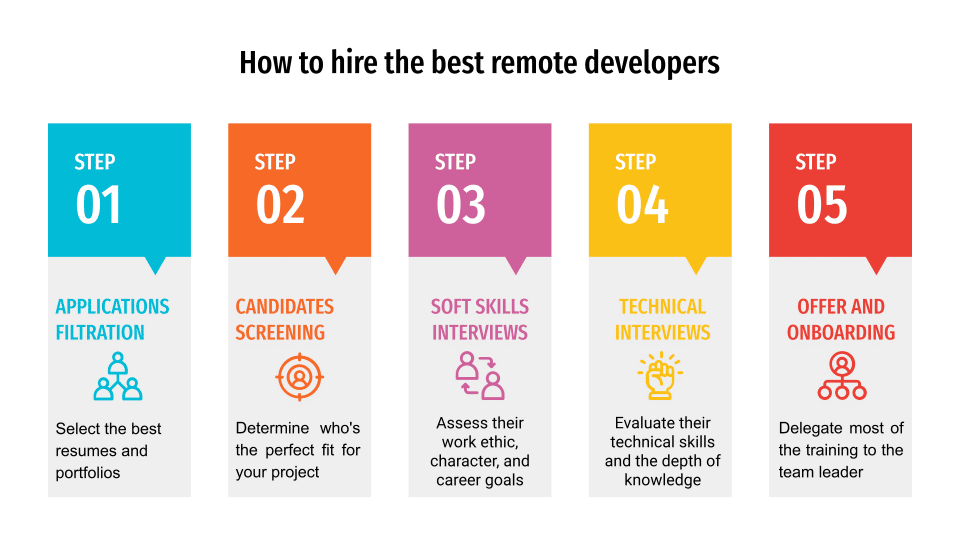How to work with remote developers? Part II.
How to hire the best remote developers?
Are you still wondering if hiring developers remotely is a viable strategy for your business? Then this article is for you. We’ve already covered whether it’s worth working with remote developers and the tools you need in your toolbox to do so in the most efficient way possible.
The second part will focus on the steps you should take to ensure that the hiring process of skillful remote developers is as smooth as possible. It will settle your concerns when questions like “How can I hire remotely?” and “How do I find developers to work with?” arise in your mind.
Buckle up and make notes to increase your chances of creating a team of professional developers worth your time and money. The cherry on top is that they’ll also be easy to manage.
How to successfully hire remote engineers?
To hire remote engineers that’ll stick around for the long haul, you’ll need to be meticulous in your selection process. This means knowing the benefits of hiring remote developers and understanding the company’s needs and possibilities. It also means recognizing the challenges of working with remote developers and developing techniques to alleviate the said challenges.
Here’s why you should hire remote engineers and never look back:
Why hire remote engineers instead of on-site staff?
You might be thinking — why hire remote engineers at all? Office work has been here for ages. It seems to be going pretty well for most companies and usually leads to a more efficient collaboration with other teams. However, studies show that remote work increases productivity by 77%. It also saves time on lengthy commutes and maintains a better work-life balance.
It’s a great idea to hire remote engineers, no matter your industry. Here’s why:
Benefits for employers
- It creates autonomy.
Everyone can work relatively well under constant supervision. However, that changes when no boss stands over your shoulder and tells you what to do. Working from home enables remote engineers to take on more responsibility and accountability. This, in turn, lifts some weight off the employer’s shoulders. - It creates access to a broader range of candidates.
You can find and hire remote engineers with better qualifications thanks to global access to the talent pool.
- It reduces expenses associated with in-office work.
Let’s be honest. Renting large office spaces and paying for wi-fi, office equipment, and other amenities becomes troublesome when the headcount of your staff reaches several dozen. Why not save on this and get remote professionals on board instead?
Benefits for employees
- It skyrockets productivity levels.
It’s not news that working at the office and chatting with colleagues doesn’t necessarily equate to getting more work done. When you hire remote engineers, you eliminate the water cooler chat and streamline the working process. It’s no longer disturbed by the colleague who needs your advice on what outfit to buy for that date on Friday.
- It gives more flexibility.
Having a flexible schedule is worth its weight in gold. Your employees feel more in charge of their life when they can schedule their work schedule around their doctor appointments and not vice versa. Remote work also allows you to hire remote engineers from all corners of the world.
Freelancer or a remote engineer. Whom should I prefer?
Whether you decide to hire a freelancer or a remote engineer, chances are you’ll come across various pros and cons for both scenarios. Carry on reading to get recommendations that could help you make an informed decision. Ensure that the staff you hire positively impacts your business and doesn’t bring any additional hurdles.
Although freelance engineers save you time and money, there’s a high risk of them vanishing mid-task. Granted, there’s a lot of talent for you to pick from, but gauging their expertise isn’t always easy. Creating trustworthy relationships with freelance engineers can be even more challenging because they are not committed to your company. All of the above will make you think twice about whether you should hire a freelancer or a remote developer.
Remote engineers come with significantly more security for the company than freelance engineers. Just like freelancers, they come in all shapes and sizes, thus allowing you to have a good selection of candidates from every field. But there is one significant difference. They are more dedicated to the purpose shared by everyone else at the company and aren’t likely to bail on you. They are also known for delivering higher-quality work despite possible communication issues.
Try creating a pros and cons list when choosing to hire a freelancer or a remote engineer. You’ll likely notice the same trend we described. If it sounds like you’ll be better off hiring remote developers, keep on scrolling to see what else there is to consider.
Points to consider before hiring remote developers
Before you jumpstart the process and hire remote engineers, you should determine a couple of things. And no, it’s not on what platform to post the remote web developer’s job description. You’ll cross that bridge when you come to it. Instead, focus on answering the following questions:
-
Do you have a clear understanding of your development needs?
To get an idea of your development needs, you should identify your project’s requirements. Plenty of components make up a successful project: from the number of developers needed to fulfill the project’s demands to the remote developer management tools you’ll need to use. You might also need to decide on the platform you’ll be aiming at. This will help you determine what programming language the remote engineer you hire needs to know.
-
Have you defined the budget in advance?
Even if you already know how much you can allocate to one project, there’s more to decide on. Apart from knowing how to manage remote developers, you should also know who’s worth the price they’re offering and who isn’t. The rule of thumb is to check whether the candidate can provide the following:
– a letter of recommendation from the previous employer,
– client testimonials,
– a decent portfolio.
This way, you’ll be able to get more bang for your buck.
-
Have you established the preferred communication channel?
Take communication under control by being clear about the communication channels you’ll be using. This rings true when remote developers collaborate on a single task from various time zones. Not only will establishing one communication channel help manage remote engineers. It’ll also aid in keeping the process as transparent as possible. Slack, Asana, Jira, and Redmine are some of the most popular tools WFH developers worldwide use to make the interaction and project management process clear and understandable.
-
Did you appoint someone to supervise your remote developers?
Every team needs a team leader, and your remote developers aren’t an exception. Usually, project managers, senior software developers, and the like take the supervisor role. This alleviates the employer’s burden of managing every employee separately. A remote team is no different. You need an in-house manager responsible for the remote developers you hire. You can outsource the task of finding a team supervisor or look for one on the IT forums.
How can I hire remotely in 2022?
Hiring remotely comes with its own set of challenges. Employees generally favor the remote work setting. As many as 65% of respondents within a FlexJobs study would rather work remotely full-time. However, the recruitment process remains somewhat time-consuming and tedious. It takes a lot of effort to:
- attract the right pool of candidates,
- filter them out,
- choose the best ones based on their skills,
- interview them,
- and finally, make an offer.
Where can I find the best full-time remote developers?
Before you even get to posting remote contract developer jobs, you need to decide on the channels you’ll be using to find talent. However, we advise you not to limit yourself to standard job boards, including Indeed, LinkedIn, Remote.co, and WWR, and freelance marketplaces like UpWork, Fiverr, Codeable, and Toptal.
There are many non-obvious ways of finding remote workers, like a post on your company’s or professional community’s Telegram channel or a targeted Facebook ad. Don’t forget to ask for referrals everywhere you can. Search for professional business networks and specialized web resources, both local and international.
Now you can begin the hiring process to find the best full-time remote developers.
Filter out the applications and begin screening the candidates
Say you settled on the top 10 applicants whose resumes and portfolios meet your job description’s requirements. The next step would be to start going through their applications to determine who’s the best fit. Use tools like Stack Overflow and GitHub to better understand whose qualifications stand out. You’ll find candidates who will be helpful in the project you’re hiring for. The best full-time remote developers will not oppose completing a short task to see their coding skills in practice.
Perform soft skills interviews
Once you narrow your list down to even fewer candidates, you can proceed with soft skills interviews. They aim to gauge the remote developer’s character, work ethic, and career goals. This will help you establish if the candidate shares your company’s values. They also let you know if his personality will mesh well with the rest of the project team.
Conduct technical interviews
Guess which is the most telling part of the hiring process? It is observing how well the candidate solved past problems during a technical interview. Ask him questions about the projects he’d worked on in the past. Evaluate whether his way of thinking aligns with what you need to make an offer. A senior developer or a team leader can determine what makes the best full-time remote developers.
Make an offer and commence the onboarding process
It’s time to make someone an offer. When the remote developer accepts the offer, you can set the onboarding process in motion. Introduce him to the team’s communication channels to collaborate, make sure the paperwork is in order and set up the first meeting. Delegate most of the training to the team leader or an in-house engineer already familiar with the internal processes.
Build your remote workforce with Optimum Web
The good news is that you don’t need to look any further than Optimum Web if you’re looking to build your remote workforce. With 15+ years of experience in remote team hiring and management under our belt, we can confidently say that we know how to do it best. Our teams have always been spread throughout the world. This situation taught us how to handle remote work from the get-go. It also positively impacted our company when the pandemic hit, and most companies were forced to adapt.
We prioritize team-building activities so that our team members feel close to each other even when thousands of kilometers apart. Thanks to the collaborative nature of our work, we can deliver on our promises and provide your company with the most optimal IT team. Take a look at our services page to get confirmation of our abilities to contribute to the success of your most demanding projects.



